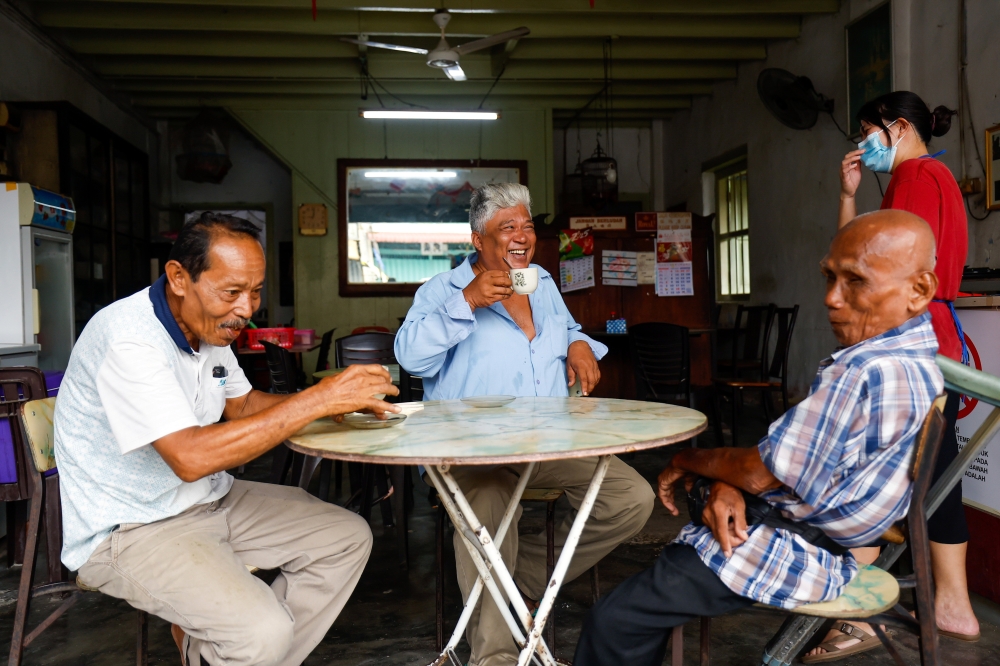TAPAH, April 21 — Xin Aun Nong Yong, a nondescript coffee shop located at Tapah Road here may not boast the ambiance of today’s modern kopitiam but it is steeped in nearly a century of history.
Opened nearly a hundred years ago, it has remained a spot where the local people of all races come together for a cup of coffee or tea, or to enjoy the breakfast fare, particularly the toast which is generously spread with kaya (coconut jam), made using the original family recipe passed down by the coffee shop’s founders.
But Xin Aun Nong Yong does not just serve delicious toast, pau (steamed buns), cakoi (deep-fried dough sticks), soft-boiled eggs and beverages — it also fosters warm relationships among the locals that have stood the test of time.
Opening as early as 6 am, the kopitiam — run by Phua Ah Ling, 65, a second-generation member of the founder’s family, together with her husband Soo Kam Chow, 73, and their daughter Soo Hui San, 34 — is always bustling with customers.
Phua is grateful that although her shop may not be as modern as today’s cafe chains, it remains a key gathering spot for the people of Tapah.
“About 70 per cent of my customers are Malay. Perhaps it’s because I was born and raised here. Here, everyone knows each other,” she told Bernama, adding the coffee shop only serves halal food.
“Every morning, customers sit down to enjoy hot ‘kopi O’ and cakoi while chatting about current issues.”
Phua Ah Ling said another factor for their shop’s longevity is their steamed buns, which come with chicken, kaya and red bean filling. — Bernama pic
When asked what makes the kopitiam special, Phua answered simply: “Harmony! This place is where everyone can sit at one table, regardless of race. Since long ago, Malays, Chinese and Indians (from and around Tapah) have been coming here to drink coffee together. I’ve been seeing this since I was a child.”
She added that another factor for their shop’s longevity is their steamed buns, which come with chicken, kaya and red bean filling.
“Every day, I wake up as early as 4 am and I start my routine by preparing the ingredients for the pau, which we make using the same methods my father used. For our kaya, the ingredients are cooked for 10 hours using a firewood stove,” she said, adding they produce around 120 steamed buns a day.
According to Phua, her kopitiam is more than just a business — for her, it is a space where the older generation shares stories of the past and the younger generation learns the roots of unity.
“I hope my children will continue running this shop. When I’m no longer around, let it remain a place where the locals can come to eat and drink together. It’s not about the money, it’s about the heart,” she said.

Opened nearly a hundred years ago, it has remained a spot where the local people of all races come together for a cup of coffee or tea, or to enjoy the breakfast fare, particularly the toast which is generously spread with kaya (coconut jam), made using the original family recipe passed down by the coffee shop’s founders. — Bernama pic
Gravedigger Abdul Rahman Mat Yassin, 69, said he loves starting his day at the kopitiam due to its harmonious atmosphere.
“Usually before heading to the cemetery, I’ll stop by here for breakfast. Every time I come, it reminds me of my youth with my friends,” he said. He enjoys the delicious coffee and toast served but the soft-boiled eggs remain his all-time favourite.
For Ha Kin Chai, 77, the kopitiam holds memories of his childhood when he often came there with his family. At that time, the coffee shop was run by Phua’s father.
“I used to look forward to eating the cakoi and pau because they were soft and tasty. The taste is still the same today,” he said.
Another regular customer P. Janagee, 54, said she enjoys visiting the kopitiam because of its calm atmosphere and the warm hospitality of the owners, who make everyone feel welcome.
“To me, this place isn’t just for eating but also for chatting and reconnecting with old friends without feeling awkward. It feels like family here,” she said. — Bernama








